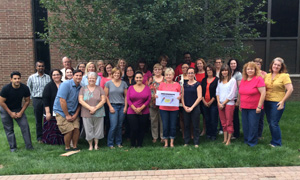 For 60 business days, International Reading Association staff took on the International Literacy Day (ILD) 60-for-60 challenge. The challenge was implemented in classrooms across the globe to incorporate an additional 60 seconds of literacy into every day with fun, interactive activities. The goal? To establish a literacy “habit.” If we were going to ask educators to take on the challenge, we would, too.
For 60 business days, International Reading Association staff took on the International Literacy Day (ILD) 60-for-60 challenge. The challenge was implemented in classrooms across the globe to incorporate an additional 60 seconds of literacy into every day with fun, interactive activities. The goal? To establish a literacy “habit.” If we were going to ask educators to take on the challenge, we would, too.
We began with “Would you rather…” questions, asking staffers to select from just two options. Who would you rather take to prom, Ophelia or Juliet? Would you rather be a superhero or supervillain? Most answers during that two-week stint had us laughing at our desks.
“Can I go with neither? I mean they both died, and who needs that aggravation, am I right?”
“Supervillain! A Superhero has too many battles, enemies and, for some reason, also seems unhappy. So what if people don’t like a villain. I could take the day off and pick and choose my battles.”
Then, moving on to Word of the Day, we emailed out mostly unfamiliar words to staff members and asked that they respond with a sentence using that word or use it in conversation as much as possible during the day.
We were pretty impressed with our staff’s vocabulary.
Daralene Irwin, front end developer in Business Solutions at IRA, recognized “frabjous” as a Louis Carroll Stevens invention first used in Through the Looking Glass and shot back a line from “The Jabberwocky.”
Dan Mangan, director of Public Affairs, admitted to hearing “palaver” regularly during childhood to chastise against “idle talk.”
Director of Finance Linda Marston said that was her favorite activity (and one we revived in the penultimate week of the challenge). “Trying to use (the word) throughout my daily conversation was very interesting and thought-provoking,” she said.
Next, we imagined our trip to the International Space Station and what we would pack up if we were leaving Earth for an entire year.
From our favorite albums to our most cherished keepsake, we were asked to go as small as 3-inches-by-3-inches for meaningful items to put in our Astronaut Preference Kits.
By working through a number of writing prompts, like “Tweet it Loud, Tweet it Proud” and “Six Words in 60 Seconds,” these literacy minutes were a welcome break from the routine and a terrific way to get to know each other better.
“It’s surprisingly hard to create a new daily habit, even when you’re only committing to 60 seconds a day,” said Rachel Krall, IRA development manager. “I realize now why it’s so hard for some people to find 30 minutes to work out when it’s not part of their regular routine! I thought the activities were a nice mental break from our workday, and I’m sad the 60 days have passed.”
At times it was difficult to maintain our dedication to the challenge, but we heard back from educators out there, some of whom said they would continue with their 60-second exercises all year long. We were all excited to hear how classrooms were faring across the country and around the world.
“I’m curious to find out how they made it work,” Krall said. “School days are already packed, and even though 60 seconds doesn’t seem like a lot, I’m sure it wasn’t easy to find the extra time.”
A number of teachers in Hyderabad, India, who showed us samples of their students’ writing and how they chose writing prompts and incorporated the activities into their everyday schedules.
“My class of grade 5 participated in the ILD 60-for-60 Mission and I am really amazed to see the results,” Anushree Arora shared. “The students not only showed their writing skills but also displayed high levels of thinking skills. I never thought a 60 second activity can benefit them so much. For 60 days, my students waited eagerly every morning when I would be asking them to do the 60 second of writing.”
What’s more, we didn’t just hear from reading teachers. Recognizing that literacy is important in every curriculum, educators from every subject shared their experiences.
Elementary music teacher Teri Nieveen of Adams, NE, merged music into the challenge by selecting a weekly musical term for her students to read, spell and define in the music room.
“We also discuss other meanings of the word, or ways the students see the word outside of the music classroom,” Nieveen said mid-challenge. “It's helping us develop a musical word wall!”
Thelma Kastl, a STEM teacher at West Wilkes Middle School in Wilkesboro, NC, participated with her 160 students by reading articles together for extended periods of time.
“As an educator, parent and grandparent I appreciate this program and hope that it continues,” she says. “Thank you for this opportunity to inspire students to read more.”
Thank you for taking this challenge with us. We look forward to hearing more about your experiences now that it’s over. Feel free to tell us more at social@/.
Morgan Ratner is a communications intern for International Reading Association.